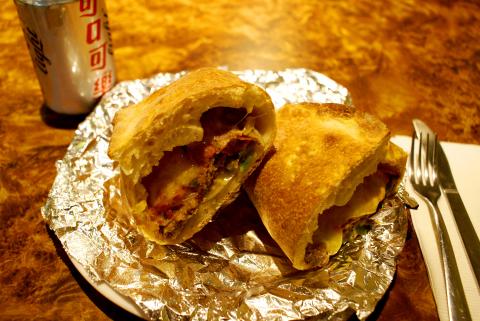“Best Stromboli you ever have!” reads the catchy caption at the top of Amore Pizzeria’s menu. That wouldn’t have been hard — I’d never had a Stromboli before entering Amore, which opened last month across the street from National Taiwan University on Xinhai Road. But after one bite of the fragrant, moist and meaty concoction that was presented to me 10 minutes after ordering, I was glad I had ordered it.
And there’s more to Amore. “Best pizza in town!” boasts a sign out front — fightin’ words. But they aren’t merely hyperbole. The homemade dough was rolled and baked into a crust that was just the right thickness, slightly crispy around the crimping and underneath, and chewy everywhere else. Mozzarella and a homemade sauce, infused with Italian herbs, covered the pie.
Amore Pizzeria’s space is plain — so plain that one could easily confuse it, as I initially did, for just another cheap knock-off pizza joint playing off guileless university students wanting a quick bite. Brown is the color of choice here: brown booths, brown tables, brown chairs and brown stools running along a brown bar. A few framed pictures — Michelangelo’s David, a caprese salad — break up the monotony.

Photo: Noah Buchan, Taipei Times
Though the decor is drab, Amore’s amiable owner, James Chen (陳建堂), knows what he’s doing. Having learned to cook Italian food in the early 1980s in New Jersey from an old Italian who ran six restaurants, Chen spent the past three decades perfecting what he does best: pizza.
He shuttered his three New Jersey shops in 2008 following the financial downturn, returned to Taipei after a 30-year hiatus and found the pizza here was not to his liking. “What is this ketchup and sugar?” he says.
Chen uses extra-virgin olive oil in his dough (which he blesses, Catholic style, before quartering it off and rolling it up) and in his Caesar salad dressing (which had a rich anchovy and caper finish). He makes the sausage and meatballs himself from scratch — again, learned from the New Jersey Italian — as he does the pasta sauces.
Stromboli is a turnover pizza similar to a calzone, but its dough is thicker. Chen said calzones are often made with ricotta, whereas Stromboli are made with mozzarella. The base is a vegetarian combination of onion, green pepper, tomato sauce and cheese, to which I added pepperoni and sausage (NT$320).
First, a warning: The Stromboli comes to the table piping hot and doesn’t cool off for quite a while, which can be dangerous. Generous slices of slightly spicy pepperoni and peppery sausage were evenly placed throughout the inside, so that a meaty morsel was found in every bite of bread.
Amore’s 12-inch supreme pizza (NT$480) earns its moniker. I haven’t seen so many toppings — sausage, meatball, pepperoni, green pepper and onion — for a long time. It may be possible that there are too many toppings. A rare case of too much of a good thing.

Growing up in a rural, religious community in western Canada, Kyle McCarthy loved hockey, but once he came out at 19, he quit, convinced being openly gay and an active player was untenable. So the 32-year-old says he is “very surprised” by the runaway success of Heated Rivalry, a Canadian-made series about the romance between two closeted gay players in a sport that has historically made gay men feel unwelcome. Ben Baby, the 43-year-old commissioner of the Toronto Gay Hockey Association (TGHA), calls the success of the show — which has catapulted its young lead actors to stardom -- “shocking,” and says

Inside an ordinary-looking townhouse on a narrow road in central Kaohsiung, Tsai A-li (蔡阿李) raised her three children alone for 15 years. As far as the children knew, their father was away working in the US. They were kept in the dark for as long as possible by their mother, for the truth was perhaps too sad and unjust for their young minds to bear. The family home of White Terror victim Ko Chi-hua (柯旗化) is now open to the public. Admission is free and it is just a short walk from the Kaohsiung train station. Walk two blocks south along Jhongshan

The 2018 nine-in-one local elections were a wild ride that no one saw coming. Entering that year, the Chinese Nationalist Party (KMT) was demoralized and in disarray — and fearing an existential crisis. By the end of the year, the party was riding high and swept most of the country in a landslide, including toppling the Democratic Progressive Party (DPP) in their Kaohsiung stronghold. Could something like that happen again on the DPP side in this year’s nine-in-one elections? The short answer is not exactly; the conditions were very specific. However, it does illustrate how swiftly every assumption early in an

Snoop Dogg arrived at Intuit Dome hours before tipoff, long before most fans filled the arena and even before some players. Dressed in a gray suit and black turtleneck, a diamond-encrusted Peacock pendant resting on his chest and purple Chuck Taylor sneakers with gold laces nodding to his lifelong Los Angeles Lakers allegiance, Snoop didn’t rush. He didn’t posture. He waited for his moment to shine as an NBA analyst alongside Reggie Miller and Terry Gannon for Peacock’s recent Golden State Warriors at Los Angeles Clippers broadcast during the second half. With an AP reporter trailing him through the arena for an